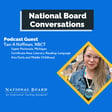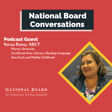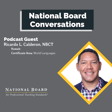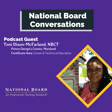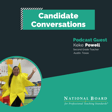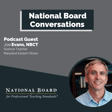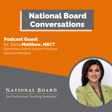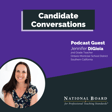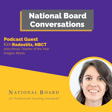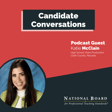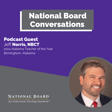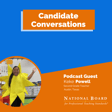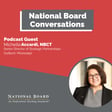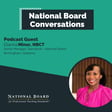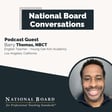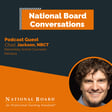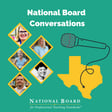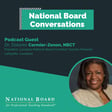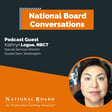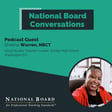Final Episode Announcement
00:00:01
Speaker
Welcome everyone to National Board Conversations. This is episode 8, our final episode of the season. We're so grateful to have been able to provide this programming for you and we thank you for tuning in. It was a really great opportunity and we had so much fun connecting with all these National Board Certified Teachers and Educators.
00:00:18
Speaker
and we're just really proud of our teachers in America. So thank you for listening. And if you're a fan of the podcast, share it around. Tell your friends, colleagues, other educators and teachers. Our hope is to get these talks to as many listeners as possible and help them on their journey to national board certification.
Introduction to Jonathan Medeiros
00:00:34
Speaker
Today's guest is Jonathan Medeiros. He is a national board certified teacher based in Hawaii. Our conversation centered a lot around self-reflection, you know, which is a major tenet of the national board process. But we've talked a lot about how we can be self-reflective and be nimble in order to pivot so that we can serve as the students and offer a really enriched and dynamic education experience.
Importance of Self-Reflection in Teaching
00:00:56
Speaker
The ideas we discussed seemed even more relevant considering the pandemic that we're all living through, and it was just so refreshing to get his perspective on all this stuff and just chat with him about education and get his take. So without further ado, here we are. Jonathan, thanks for joining us. How are you? I'm well. Thank you. How are you doing? I'm great. I'm great. I was talking just before we started with you. I could hear the birds chirping in the background. Tell us where you are. We have these beautiful birds singing.
00:01:25
Speaker
Yeah, I'm in my classroom on Kauai at Kauai High School, so we're surrounded by a variety of birds. That's great. Why don't you introduce yourself to the audience? All right, yeah. My name's Jonathan Medeiros, and I am a public school teacher here at Kauai High School. I was born and raised here. I actually graduated from this high school. I've been teaching here now for 15 years.
00:01:59
Speaker
spend time getting out with my family and going on walks or spending time at the beach or in the water as much as possible. Yeah, and you have that beautiful Hawaii water and sand, so that's a real clustering pandemic time. Yeah, we are lucky. Yeah, that's
Jonathan's Journey to Teaching
00:02:14
Speaker
great. So tell me, how did you get into teaching? So the short and glib answer is I became a teacher because of a girl. I had never really planned to be a teacher, certainly not public school.
00:02:34
Speaker
I studied language arts and philosophy. I have a master's degree in literature. And then I met this awesome person. And in the beginning of her relationship, at one point she said, hey, by the way, I'm going off to grad school to become a teacher. And the implication was, she's moving away. And I was like, oh.
00:02:55
Speaker
Maybe I could do that. So she encouraged me. I followed a girl. And then it turned out that was an amazing decision because I love this job. I love teaching. I get to learn every single day. Also, side benefit is I love that person. And so I got two great things out of that.
00:03:15
Speaker
That's great. You did find a love. You didn't end up marrying this person, did you? We are married. This is the mother of my children. Oh, wow. She's an amazing teacher and inspiration as well. She really saw that in me, I guess, encouraged to be more serious about it. Yeah, that's a real win-win. You got two loves out of it. Yeah. That's the best case scenario for that story. Yeah, it was great.
Pursuing National Board Certification
00:03:42
Speaker
At what point on this journey did you go for a national board? How did you find out about the national board and what made you want to do it?
00:03:48
Speaker
had been teaching three or four years by the time national board certification was on my mind regularly. And I believe a kind of an expert veteran teacher, Tracy Edica, who heads up the national board work in the state of Hawaii now. Similar to my wife, Tracy saw something in me. She said, you need to do this. And I asked her, what is that?
00:04:16
Speaker
for that. I don't think I can. And we kept running into each other. She works on a different island, but we kept running into each other, which I think kept tugging at her mind. This guy is kind of in everything and wanting to learn. So she encouraged me to seek national board certification 10 or 11 years ago. And when I did, I was the only person in that year
00:04:41
Speaker
And I believe there was one other person on my island. There were very few pathways to connect each other. So I felt kind of alone when I was going through it the first time, except for Tracy, who we emailed a lot during that 18 months that it took me to get my act together and get my certification done the first time. Right. And how was the journey? What was National Board Certification
Reevaluating Teaching Approaches
00:05:03
Speaker
like for you? It was daunting at first, but I took it one piece at a time and went through it slowly.
00:05:12
Speaker
self-reflection really kind of jived with the way I live my life anyway. I'm always taking in the experiences around me and asking questions like, well, how can I do that better? So that felt natural to me. And I really learned a lot through that self-reflection part of the natural word process. So in the end, I felt like I'd gone through a whole not
00:05:38
Speaker
even to date, right? It was the most I've grown, I think, in the shortest amount of time as a professional, really set the foundation for me for the rest of my career. So for you, what do you think the most beneficial part of earning this certification was? What part sticks with you the most? So going through the dashboard process as a language arts teacher really forced me to reevaluate lots of preconceived ideas that I had. And one of them specifically was this idea of text because the dashboard process is asking me and some of the evidence they're asking me for is non-textual evidence.
00:06:12
Speaker
how much bigger I could make my classroom, how confining the idea of text had been up to that point. You know, I looked back on the first four years there and saw my smaller idea of text being something written that's inside of a book with covers really limits us as teachers and students. It limits us to what we can think about, what we can read, and how we can show our learning. Having the National Board process made me really focus in on that.
00:06:45
Speaker
has grown because of it. We spend time every year literally questioning what texts can be. And you can see it on the students' faces too when they start to realize, oh, there are less limits here. I can express my learning in so many more ways. It helps them be more connected to school, I think,
Pandemic's Impact on Teaching
00:07:03
Speaker
Right. And why don't we talk a little bit about how there's the smaller idea of the classroom that's totally exploded with COVID and the pandemic? And how are you taking the same idea process to reevaluating the classroom? Yeah, it's a great question. And I actually hadn't realized it until this conversation. So I'm glad we're talking about it, Luke. What I went through with that concept of text was
00:07:27
Speaker
like a 10 year ago version of the same thing that we're thinking about now. Lately, I've been saying a lot that we need to question these ideas. So right now, even what is a class or a classroom?
00:07:42
Speaker
is a question we should be asking ourselves. And the pandemic has forced many teachers to confront that question and all kinds of other related questions. How do I make a learning space when 90% of my students are in places that I can't see and I can't control the comfort or safety of those places? So how do I build a classroom
00:08:07
Speaker
at this point, but I'm glad for my experience with National Board 10 or 11 years ago, struggling through those ideas of how do I show that I can teach writing without textual evidence? I'm glad I went through that because it better prepared me for this moment to ask those other questions. How do I make a classroom that doesn't have walls? I felt better prepared to ask those difficult questions.
00:08:34
Speaker
Right. So, so this journey, you already started as a result of, of the self-reflection you had from national board certification kind of armed you to be ready for this unforeseen change in education for the pandemic. Exactly. Yeah. I certainly felt I can see a connection. I feel better prepared for this, you know, national board process made me be flexible and creative and self-reflective. And so I had built those muscles already, right?
Purposeful Teaching Content
00:09:02
Speaker
you've kind of been, because of this training that you've gotten and the way that you've manifested it into your pedagogy, like you've been thinking about this for a while. So I'm just wondering, what kind of things do you think about to open up your mindset and blow the walls out of this classroom and make it an open space? You know, what are you thinking? Yeah, I have been thinking about these things for a while. And so have many people like I'm not special because I'm thinking about the purpose of homework, for example, or how to do attendance differently. Like those are some of the kind of bigger picture questions
00:09:37
Speaker
to ask themselves the simple question, why? For any action that they are going to ask their students to take, we need to ask, why? What do I want from the student? And the answer can't be, and I've heard this answer from colleagues, which is sad, the answer can't be so that I can give them a quiz and put a grade in the grade book. That obviously can't be the answer, right? We need to
00:10:04
Speaker
straight line between our teacher actions and positive student result. And I think it's very important for the teacher to be crystal clear about those purposes. So that's one question that I would always and I do always ask or ask teachers to ask themselves, why am I doing this thing? Get really clear on that. And then I think another good question
00:10:34
Speaker
and simple as possible. Yeah, totally. And for teachers, I mean, it's pretty clear from our conversation right now, but let's lay it out a little bit more. Why is it important to be open to a pivot or to be open to this self-reflection, to throw away your lesson plan? Why is that important? I mean, the short answer is it's important because your class changes by necessity, right? You can't just
Adapting to Changing Classroom Dynamics
00:10:57
Speaker
do the same thing all the time. You can't just have the same idea of what's the best way to teach simply because
00:11:06
Speaker
single year so we have to be ready to in my opinion the world is changing your the job is never the same because the people in your classroom are never the same and your students evolved throughout the year too right so your classroom is always different right I start the year by telling my students about failure I talked to them about
00:11:34
Speaker
We should think from the very beginning that the goal is to change and we'll do more learning that way. Right. And for you, you know, 10 years, you're a national board certified teacher, you're going into maintain your certification. That could be really daunting and there's a fear of failure in that. How did you think about that when you're going into that process?
00:11:55
Speaker
There really was a fear in the back of my head. So I could see it coming from a few years away. And I was right at the end of the timeline where I knew that I was going to have to be doing maintenance under the new system. And that added an extra layer of fear to me, like, I don't know this quite as well. But naturally, I embrace those unknowns and those challenges. So I was nervous, but I decided to kind of try to live what I tell my students that
00:12:24
Speaker
seeking out risks or challenges is important and seeking out struggle is important because that's where we learn. And so I easily could have decided, you know, here I am at year 15. I've already certified. I can kind of coast for a while, but it's not a satisfying place for me personally to be. I always want to change.
00:12:52
Speaker
growth spurt, as it were. I think related to this idea of being self-reflective and seeking challenges and kind of knowing that you want to grow and change, I think related to those ideas is the idea of curiosity.
Curiosity and Empathy in Education
00:13:08
Speaker
And that's a whole other topic that I'm really passionate about. I think there's a lot of power in teaching students to be curious and modeling curiosity, even on a very simple level. Luke, if we can be
00:13:24
Speaker
each other, we can end up building empathy for each other. And I feel like that's not to be too out there like hippy dippy, but I feel like that's an important thing to build. Like our world could use a good cup of empathy right now. So any way to build that I think is important. So that's something I would leave us with. Building that empathy is key.
00:13:47
Speaker
So let's honor Jonathan's words. Let's all be curious. Let's look around us. Let's think of others. Let's meet people and have meaningful experiences. And we'll raise our cup of empathy. We'll raise a glass. And I toast you for listening to National Board Conversations season one. It was such a pleasure. My name is Luke Karayat-Amud. I've been your host.
00:14:09
Speaker
Again, if you've liked the podcast, please share it around with teachers, colleagues, friends. Leave us a review, leave us a rating. Let us know how we're doing. Give us some tips and pointers. We'd love to hear from you. And we're just really happy to be able to be sharing these stories with you. So thank you again.
National Board Certification Resources
00:14:27
Speaker
If you'd like to know more about the national board certification process, please visit the website at www.nbpts.org.
00:14:38
Speaker
In the meantime, stay safe, and I'll talk to you again soon. Cheers, everyone.

